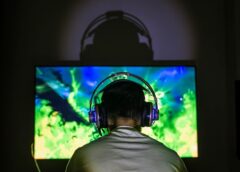Depression and anxiety can act as moderators that affect the relationship between gaming time and gaming disorder.
By Katie Lam
Gaming disorder can be defined as a pattern of video gaming with characteristics including impaired control over gaming, increasing priority given to gaming over other interests and daily activities, and continuation of gaming despite negative consequences, according to the International Classification of Diseases (ICD-11). The behavior pattern should impair personal, social, or other important areas for over 12 months for it to be diagnosed. There is approximately 3 percent of the population with gaming disorder, meaning that most gamers do not experience gaming disorder.
However, what causes that 3 percent of the population to develop gaming disorder? Apart from the amount of time one spends on gaming, psychological and neurobiological factors may also be involved in the disorder. Researchers at Jagiellonian University have presented how other mental health conditions—depression and anxiety—can alter the correlation between the amount of time spent on gaming and the risk of developing game disorder.
Gaming time and gaming disorder
The relationship between gaming time and gaming disorder seems obvious at first sight. However, it is not always as straightforward as we might think. Previous studies on the correlation between gaming time and gaming disorder varied, meaning that this relationship is not very consistent. This brings in the possibility of different additional factors, which can be mediators or moderators. Mediators explain the relationship between gaming time and gaming disorder, and moderators affect the strength of such relationship. In this study, researchers found that depression and anxiety can act as both mediators and moderators of this correlation.
RELATED: Check out other research into the benefits of video games.
Role of depression and anxiety
By analyzing the interaction between game time and depression symptoms, researchers found that participants with more depression symptoms (higher level of depression), show a significantly stronger correlation between gaming time and the risk of developing gaming disorder. However, it is not the same for participants with fewer depression symptoms. For them, the correlation is insignificant. This means that an increase in gaming time is not associated with an increase in the risk of developing a gaming disorder. The results are similar for anxiety. There is a significant positive correlation between gaming time and gaming disorder risk in the participants with higher levels of anxiety. For the participants with lower levels of anxiety, the correlation is insignificant.
RELATED: Panic! In the Brain: What Causes Panic Attacks?
These effects might be explained by how depression or anxiety may allow individuals to gain more pleasure from gaming. The researchers suggested that gratification contributes to dysfunctional coping styles, meaning that the pleasure gained from gaming can lead to avoiding negative situations or emotions by turning to video games. This is a process of positive reinforcement: the pleasure they get from gaming can increase their chances to repeat their behaviors. This can make getting off gaming harder and harder for them.
Are they self-aware?
The research team also identified some similarities and differences between self-report and the diagnostic test. This research consisted of surveys with a set of questions that included a gaming diagnostic test, but also a question on whether the participants find their gaming habits to greatly hinder their functioning. All of those who met the diagnostic criteria admitted that gaming greatly hindered their functioning. However, quite a large number of participants who did not meet the gaming disorder criteria thought that they had a gaming problem. The researchers suggest that this indicates the importance of screening tools, as the opinion of the individual may be inconsistent with their actual condition.
This study sheds more light on how other mental health conditions can influence the development of gaming disorders. The results showed that anxiety and depression can act as risk factors for gaming disorder, but only when combined with gaming habits. Although the disorder is not very common amongst the general population, we should still be mindful of the time being spent on video games. We could pay more attention to ourselves and those around us, as to whether gaming acts as entertainment in daily life or if it’s become a dysfunctional coping style.
This study was published in the peer-reviewed journal Scientific Reports.
Read next about playing video games for science: How Video Games Are Making Research Fun
References
Brand, M., Young, K. S., Laier, C., Wölfling, K., & Potenza, M. N. (2016). Integrating psychological and neurobiological considerations regarding the development and maintenance of specific Internet-use disorders: An Interaction of Person-Affect-Cognition-Execution (I-PACE) model. Neuroscience & Biobehavioral Reviews, 71, 252–266. https://doi.org/10.1016/j.neubiorev.2016.08.033
Strojny, P., Żuber, M., & Strojny, A. (2024). The interplay between mental health and dosage for gaming disorder risk: a brief report. Scientific Reports, 14, 1257. https://doi.org/10.1038/s41598-024-51568-9
World Health Organization. (2023). Gaming disorder. https://www.who.int/standards/classifications/frequently-asked-questions/gaming-disorder


About the Author
Katie Lam is an undergraduate student studying neuroscience in London but born and raised in Hong Kong. Her particular interests are mental health, art, and capybaras.

